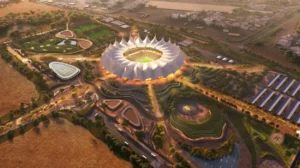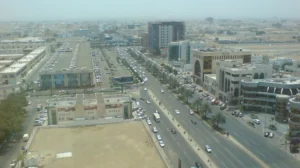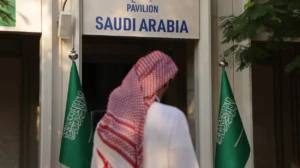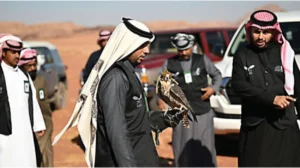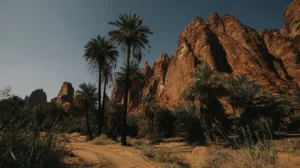- Home
- Why Boycott?
- Human Rights Violations
- Migrant Workers Exploitation & Kafala System Abuse
- Saudi Arabia’s War Crimes
- Freedom of Press and media censorship
- Torture And Unfair Trials
- Saudi Arabia’s Anti-Climate Agenda
- Bogus Stadium Infrastructure
- Sportwashing & Political image
- Saudi Arabia’s Unfair bidding Process
- FIFIA Corruption and Transparency issues
- Poor Treatment of LGBTQ community
- Security risks for spectators
- News
- Get Involved
- Contact Us
Anti Climate Policies And Greenwashing
Why Saudi Arabia’s Anti-Climate Policies make it unfit for FIFA 2034
Saudi Arabia’s hope to stage the FIFA World Cup 2034 is inconsistent with its environmentalism. Though the kingdom has tried to show itself as a front-runner in green initiatives, its anti-climate policies and greenwashing show underlying difficulties that might threaten its suitability for holding a truly international event.
Though its claims of eco-conscious progress are front and center, Saudi Arabia’s anti-climate change policies, environmental problems, and greenwashing campaigns exceed its major infrastructure developments.
This article will thoroughly cover why it is important to boycott Saudi 2034 FIFA World Cup bid in addition to major environmental issues like water scarcity, air quality, and desertification, therefore arguing against Saudi Arabia as a good venue for FIFA 2034.
Saudi Arabia and climate change: The rising challenge
With its huge oil supply, Saudi Arabia and climate change has become one of the premier oil producers, and much of its economic wealth is based on it. Still, this reliance on fossil fuels makes the nation very exposed to the effects of climate change and places it in contradiction with worldwide sustainability projects. Though attempts to broaden its energy sources are still underway, these promises usually contradict facts.
Is Saudi Arabia clean?
Though Saudi Arabia has agreed to cut carbon emissions, these measures are mostly symbolic. The growth of its oil sector, which is still core to its economy, obscures the nation’s dedication to clean energy. Through projects like the Saudi Green Initiative, Saudi Arabia has promised to lower its carbon output by changing to green energy sources.
Critics, however, contend that these policies are inadequate and mostly for image-building, therefore greenwashing becomes a problem that takes away from real sustainability initiatives. A survey revealed that 71% of Saudi nationals would end their association with a company that does not take social and environmental efforts seriously, therefore expressing the general public need for authentic environmental dedication.
What are the environmental issues in Saudi Arabia
Many of KSA climate and environmental issues are aggravated by its industrial operations and geographical circumstances. Water shortages, desertification, and bad air quality—everything of which the kingdom is grappling—would impact the viability of holding a huge event including the FIFA World Cup 2034.
Water deficiency in Saudi Arabia
Among the most serious environmental challenges is water scarcity in Saudi Arabia. Saudi Arabia, among the most arid nations on the planet, suffers from a persistent deficiency of native fresh water. Desalination plants and subterranean aquifers, which are both energy-intensive, provide over 90% of the nation’s water. Desalination—a process that is not environmentally friendly—raises the question of the nation’s capability to satisfy future water needs, particularly in light of the expected population and consumption increase in next years, there is growing concern.
The repercussions of climate change—the more severe temperatures it brings—worsen the already limited water supply of Saudi Arabia and add to the water scarcity there. On a worldwide occasion such as the FIFA World Cup, where the need for water to sustain sports facilities and house great numbers of viewers would add extra strain on a system already under strain, this would present serious logistical and environmental problems.
Saudi Arabian Floods
Though a desert nation, floods in Saudi Arabia in the last few decades have become a huge problem. Especially in urban locations like Jeddah, heavy downpours and bad infrastructure usually cause flash floods. The vulnerability of Saudi Arabian urban areas to unexpected weather becomes clear from these floods, which may devastate infrastructure. Another danger of organizing a major event like the World Cup, for which infrastructure must stand up under both daily use and erratic weather events, is the country’s inability to handle such events.
Saudi Arabia’s bad air quality
One large worry is air quality in Saudi Arabia. Significant air pollution results from the country’s dependence on industrial areas, power plants, and oil refineries. Cities such as Riyadh and Jeddah have high amounts of particulate matter and sulfur dioxide. Compounded by dust storms and searing heat, bad air quality affects public health and will likely be a major problem for the FIFA World Cup. Such circumstances would be particularly dangerous for asthmatic people since they would jeopardize player and spectator’s health and safety.
Environmental issues of the desert
More than just environmental, the problems Saudi Arabia’s desert landscapes present are also financial and political. Rapid desertification is the loss of formerly arable land caused by business overuse and poor farming techniques. Furthermore, environmental problems in the desert have been worsened by urban sprawl and overwater extraction for agricultural and industrial purposes, therefore reducing the already restricted arable area of the kingdom.
Even as Saudi Arabia’s strong emphasis on major industrial projects like its Neom City development provides chances for economic expansion, they also raise worries about the destruction of natural habitats and ecosystems that support biodiversity.
Missing natural resources in Saudi Arabia
Although Saudi Arabia is wealthy in petroleum, it is missing other natural resources that might underpin long-term environmental sustainability. Most of the kingdom’s natural resource riches exist in fossil fuels, but the nation lacks natural freshwater sources and therefore cannot support varied, sustainable businesses.
Developing a truly sustainable future will be difficult over the long term given this limited availability of resources. Even though Saudi Arabia is moving ahead in solar and wind power and other renewable sources of energy, the rate of adoption is sluggish and the country’s energy infrastructure is still greatly dependent on fossil fuels.
KSA climate and its contribution to sustainability
Saudi Arabia has an extremely hot and arid climate; during summer months, temperatures sometimes exceed 50°C. Given the aridness of the area, water conservation, energy use, and general living demand special approaches. These extreme weather patterns are probably to worsen as global temperatures keep rising, therefore making it ever more challenging to create and support the needed infrastructure for organizing major international events.
What are some of Saudi Arabia’s water problems?
Mainly from desalination and uncontrolled water extraction from subterranean aquifers, Saudi Arabia has a persistent water crisis to contend with. Already beset by a serious water shortage, the nation’s problem will only get worse in the next several decades in the absence of a sustainable solution.
This brings up major issues about how, during an event such as the FIFA World Cup, where water use is a major concern, the kingdom would care about the water requirements of millions of visitors. Though the nation has tried to raise its water conservation policies, these measures have not been strong enough to solve the more serious environmental issues.
Apart from water insufficiency, Saudi Arabia deals with long droughts and extended dry spells. Long droughts endanger agricultural output and access of natural resources, something the kingdom is well familiar with from its extreme weather events. Hosting a major sports event would unquestionably be a challenge for Saudi Arabia under such circumstances, as it would need huge logistical help and water supplies.
Greenwashing: The environmental image of Saudi Arabia vs. Reality
Among Saudi Arabia’s environmental plan, the most appalling feature is its propensity for greenwashing. Marketing or presenting an appearance of environmental responsibility without authentic behavior behind it is known as greenwashing. Although Saudi Arabia has promised a lot of efforts concerning its transition to green energy, cynics contend that these efforts are sometimes used as a front to cover its continuous dependence on oil and gas extraction.
Although environmentalists cite their vast carbon footprints and damage to key ecosystems as instances of greenwashing, the kingdom&’s large initiatives such as Neom and the Red Sea Project have been promoted as sustainable projects. The difference between Saudi Arabia’s official sustainability image and its activities in the environmental field calls into question its preparedness to stage a sustainable FIFA World Cup.
Saudi Arabia’s oil Ddependency and its effect on Environmental Policy
Saudi Arabia’s ongoing reliance on fossil fuels is one of the main causes it is not ideal to host the FIFA World Cup 2034. Dependent on oil, the kingdom is still one of the world’s biggest oil producers and distributors. Although many countries are headed toward renewable energy, Saudi Arabia rather focuses on oil and makes major investments in growing its production capability. This goes against FIFA’s stressed values of environmental sustainability, which they have highlighted recently in their choice of host countries.
Fossil fuel combustion raises greenhouse gas levels, which worsen climate change and cause global warming. Although Saudi Arabia has promised to hit net-zero carbon emissions by 2060, it is still not evident how it will marry this commitment with ongoing growth in oil drilling and refining projects.
Rising questions about the long-term consequences of such a big event in an oil-dependent country come from the emissions generated by building and maintaining World Cup infrastructure therefore adding to environmental problems. Saudi Aramco intends to increase crude oil production from 12 million barrels per day to 13 million by 2027, therefore contradicting itself with its net-zero pledge.
The sustainability issues of huge infrastructure schemes
As a component of its Vision 2030 plan, Saudi Arabia has started several massive infrastructure developments. These developments, among them the futuristic Neom City, The Line, and the Qiddiya entertainment city are being promoted as sustainable and eco-friendly. Still, professionals contend that these projects imply significant land reclamation, water use, and carbon emissions, thereby contradicting the sustainability assertions of Saudi Arabia.
Neom, a smart city project valued at $500 billion, for instance, promises to operate on renewable energy. Its construction calls for the moving of native peoples, extensive deforestation, and destruction of sensitive desert ecosystems.
Designed as an eco-tourism project, the Red Sea Project is also under fire for disturbing underwater life and coral reefs. These projects’ environmental consequences also help to support the case against Saudi Arabia’s appropriateness as a FIFA World Cup host.
Risk to fans and sports from extremely hot conditions
The weather in Saudi Arabia directly threatens the health of spectators as well as players. The nation faces searing conditions as summer peaks often surpass 50°C (122°F). Already under criticism for letting the 2022 World Cup in Qatar, where extreme heat caused the event to be moved to winter, be held, FIFA has made decisions. The same issue would surface in Saudi Arabia as outdoor stadiums would demand too much electricity to keep acceptable play conditions.
For players and spectators alike, the high temperatures might also cause an increased risk of heatstroke, dehydration, and general discomfort. Although Saudi Arabia might finance climate-controlled stadiums, these would have to use a lot of energy, therefore increasing their carbon footprint. Even with sophisticated cooling systems, keeping player performance and fan comfort in such an extreme environment remains a top priority.
Experts claim that Saudi Arabia’s proposal to host the 2034 World Cup, which includes building or refurbishing 15 stadiums and expanding infrastructure, will seriously damage the climate due to rising levels of carbon dioxide.
Saudi Arabia’s environmental challenges for hosting the FIFA World Cup
Although it is known to support worldwide efforts on climate change, Saudi Arabia has no strict environmental rules meant to address industrial waste, emissions, and pollution. Among G20 nations, the country has some of the least strict environmental enforcement rules, which complicates trusting its capacity to meet sustainability obligations for the FIFA World Cup.
Saudi Arabia depends greatly on fossil fuels, with the oil and gas industry representing around 50% of its GDP. Operating with little supervision, industries including heavy manufacturing, oil refining, and petrochemicals cause great water and air contamination. Another major concern is waste management; there is little recycling infrastructure and landfills are much relied upon. Saudi Arabia might not be able to guarantee an ecologically conscientious World Cup without good legislation.
Inadequate Nominee for FIFA World Cup 2034
Saudi Arabia would not be a good candidate to stage the FIFA World Cup 2034 given its anti-climate policies, greenwashing, and neglect of major environmental concerns including water scarcity, air quality, and desertification, even though the country has advanced in environmental policy.
The obstacles presented by these problems, together with the dearth of natural resources and the kingdom’s dependence on fossil fuels, emphasize how hard it is to harmonize its objectives with the sustainability principles that FIFA now puts first for World Cup hosts.
Saudi Arabia’s environmental history highlights the need for more openness, dedication, and action to bring the country’s green claims into line with actual results. Therefore, even though it dreams of hosting it, Saudi Arabia should not be seen as a feasible venue for this well-known event.

